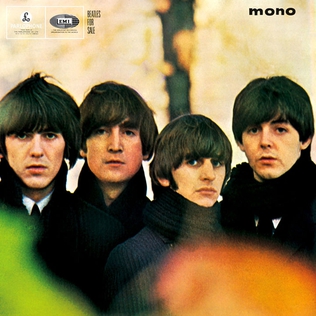
Beatles for Sale is the fourth studio album by the English rock band the Beatles. It was released on 4 December 1964 in the United Kingdom on EMI's Parlophone label. The album marked a departure from the upbeat tone that had characterised the Beatles' previous work, partly due to the band's exhaustion after a series of tours that had established them as a worldwide phenomenon in 1964. Beatles for Sale was not widely available in the US until 1987, when the Beatles' catalogue was standardised for release on CD. Instead, eight of the album's fourteen tracks appeared on Capitol Records' concurrent release, Beatles '65, issued in North America only.

"Get Back" is a song recorded by the English rock band the Beatles and Billy Preston, written by Paul McCartney, and credited to the Lennon–McCartney partnership. It was originally released as a single on 11 April 1969 and credited to "The Beatles with Billy Preston". The song is one of the few examples of John Lennon featuring prominently as lead guitarist. The album version of this song contains a different mix that features a studio chat between Paul McCartney and John Lennon at the beginning, which lasts for 20 seconds before the song begins, also omitting the coda featured in the single version, and with a final dialogue taken from the Beatles' rooftop concert. This version became the closing track of Let It Be (1970), which was released just after the group split up. The single version was later issued on the compilation albums 1967–1970, 20 Greatest Hits, Past Masters, and 1.

"Yesterday" is a song by the English rock band the Beatles, written by Paul McCartney and credited to Lennon–McCartney. It was first released on the album Help! in August 1965, except in the United States, where it was issued as a single in September. The song reached number one on the US Billboard Hot 100 chart. It subsequently appeared on the UK EP Yesterday in March 1966 and made its US album debut on Yesterday and Today, in June 1966.
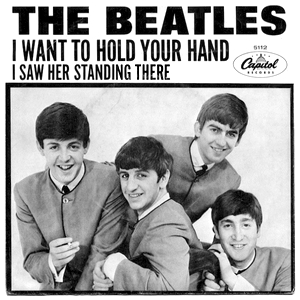
"I Want to Hold Your Hand" is a song by the English rock band the Beatles, written by John Lennon and Paul McCartney. Recorded on 17 October 1963 and released on 29 November 1963 in the United Kingdom, it was the first Beatles record to be made using four-track recording equipment.

"She Loves You" is a song by the English rock band the Beatles, written by John Lennon and Paul McCartney and released as a single in the United Kingdom on 23 August 1963. The single set and surpassed several sales records in the United Kingdom charts, and set a record in the United States as one of the five Beatles songs that held the top five positions in the charts simultaneously, on 4 April 1964. It remains the band's best-selling single in the UK and was the top-selling single of the 1960s there by any artist.

"From Me to You" is a song by the English rock band the Beatles that was released in April 1963 as their third single. It was written by John Lennon and Paul McCartney. The song was the Beatles' first number 1 hit on what became the official UK singles chart but the second, after "Please Please Me", on most of the other singles charts published in the UK at the time. "From Me to You" failed to make an impact in the United States at the time of its initial release. Instead, a 1963 cover version released by Del Shannon resulted in the song's becoming the first Lennon–McCartney track to enter the US pop charts. The Beatles' original was re-released in the US in January 1964 as the B-side to "Please Please Me", and reached number 41.
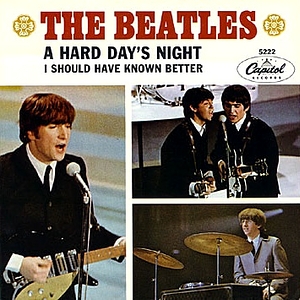
"A Hard Day's Night" is a song by the English rock band the Beatles. Credited to Lennon–McCartney, it was primarily written by John Lennon, with some minor collaboration from Paul McCartney. It was released on the soundtrack album A Hard Day's Night in 1964. It was also released as a single in the UK, and in the US
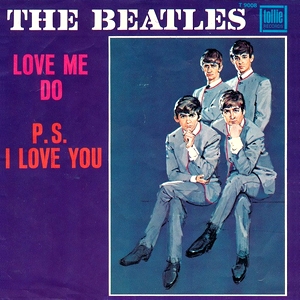
"Love Me Do" is the debut single by the English rock band the Beatles, backed by "P.S. I Love You". When the single was originally released in the United Kingdom on 5 October 1962, it peaked at number 17. It was released in the United States in 1964 and topped the nation's song chart. Re-released in 1982 as part of EMI's Beatles 20th anniversary, it re-entered the UK charts and peaked at number 4. "Love Me Do" also topped the charts in Australia and New Zealand.
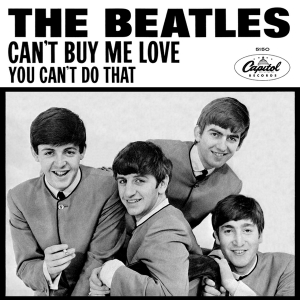
"Can't Buy Me Love" is a song by the English rock band the Beatles that was released in March 1964 as the A-side of their sixth single. It was written by Paul McCartney and credited to the Lennon–McCartney partnership. The song was included on the group's album A Hard Day's Night and was featured in a scene in Richard Lester's film of the same title. The single topped charts in the United Kingdom, the United States, Australia, Ireland, New Zealand, South Africa, the Netherlands, France and Sweden. In the UK, it was the fourth highest selling single of the 1960s.
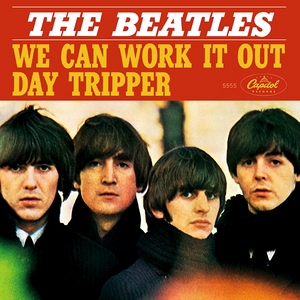
"We Can Work It Out" is a song by the English rock band the Beatles, written by Paul McCartney and John Lennon. It was first issued as a double A-side single with "Day Tripper" in December 1965. The song was recorded during the sessions for the band's Rubber Soul album. The single reached number one in Britain, the United States, Australia, Canada, and Ireland. In the UK, it was the seventh highest selling single of the 1960s.

"Paperback Writer" is a song by the English rock band the Beatles. Written primarily by Paul McCartney and credited to the Lennon–McCartney partnership, the song was released as the A-side of their eleventh single in May 1966. It topped singles charts in the United Kingdom, the United States, Ireland, West Germany, Australia, New Zealand and Norway. On the US Billboard Hot 100, the song was at number one for two non-consecutive weeks, being interrupted by Frank Sinatra's "Strangers in the Night".

"Day Tripper" is a song by the English rock band the Beatles that was released as a double A-side single with "We Can Work It Out" in December 1965. The song was written primarily by John Lennon with some contributions from Paul McCartney and was credited to the Lennon–McCartney partnership. Both songs were recorded during the sessions for the band's Rubber Soul album. The single topped charts in Britain, Ireland, the Netherlands and Norway. In the United States, "Day Tripper" peaked at number five on the Billboard Hot 100 chart and "We Can Work It Out" held the top position.

"The Ballad of John and Yoko" is a song by the English rock band the Beatles that was released as a non-album single in May 1969. It was written by John Lennon and credited to the Lennon–McCartney partnership, and chronicles the events surrounding the wedding of Lennon and Yoko Ono. The song was the Beatles' 17th UK number-one single and their last for 54 years until "Now and Then" in 2023. In the United States, it was banned by some radio stations due to the lyrics' reference to Christ and crucifixion. The single peaked at number 8 on the US Billboard Hot 100. The song has subsequently appeared on compilation albums such as Hey Jude, 1967–1970, Past Masters, and 1.

"Please Please Me" is a song by the English rock band the Beatles. It was their second single in the United Kingdom, and their first in the United States. It is also the title track of their first LP, which was recorded to capitalise on the success of the single. It is a John Lennon composition, although its ultimate form was significantly influenced by producer George Martin.

"Birthday" is a song by the English rock band the Beatles from their 1968 double album The Beatles. Written by John Lennon and Paul McCartney, mainly by McCartney, it is the opening track on the third side of the LP. Surviving Beatles Paul McCartney and Ringo Starr performed it for Starr's 70th birthday at Radio City Music Hall on 7 July 2010.

"Help!" is a song by the English rock band the Beatles that served as the title song for the 1965 film and the band's accompanying soundtrack album. It was released as a single in July 1965, and was number one for three weeks in the United States and the United Kingdom. Credited to Lennon–McCartney, "Help!" was written by John Lennon with some assistance from Paul McCartney. During an interview with Playboy in 1980, Lennon recounted: "The whole Beatles thing was just beyond comprehension. I was subconsciously crying out for help".
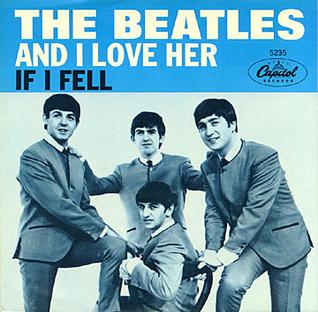
"And I Love Her" is a song recorded by English rock band the Beatles, written primarily by Paul McCartney and credited to the Lennon–McCartney partnership. It is the fifth track of their third UK album A Hard Day's Night and was released 20 July 1964, along with "If I Fell", as a single release by Capitol Records in the United States, reaching No. 12 on the Billboard Hot 100.
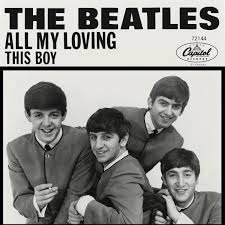
"All My Loving" is a song by the English rock band the Beatles, from their second UK album With the Beatles (1963). It was written by Paul McCartney, and produced by George Martin. Though not officially released as a single in the United Kingdom or the United States, the song drew considerable radio airplay, prompting EMI to issue it as the title track of an EP. The song was released as a single in Canada, where it became a number one hit. The Canadian single was imported into the US in enough quantities to peak at number 45 on the US Billboard Hot 100 in April 1964.
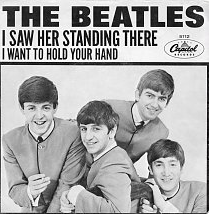
"I Saw Her Standing There" is a song by the English rock band the Beatles, written by Paul McCartney and John Lennon. It is the opening track on the band's 1963 debut UK album Please Please Me and their debut US album Introducing... The Beatles.
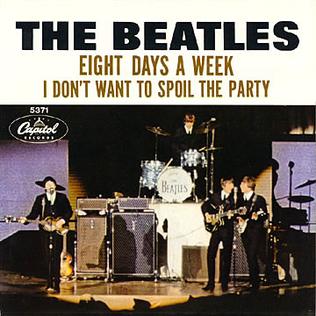
"Eight Days a Week" is a song by the English rock band the Beatles. It was written by Paul McCartney and John Lennon based on McCartney's original idea. It was released in December 1964 on the album Beatles for Sale, except in the United States and Canada, where it was first issued as a single A-side in February 1965 before appearing on the album Beatles VI. The song was the band's seventh number 1 single on the Billboard Hot 100, a run of US chart success achieved in just over a year. The single was also number 1 in Canada, Belgium and the Netherlands.


















